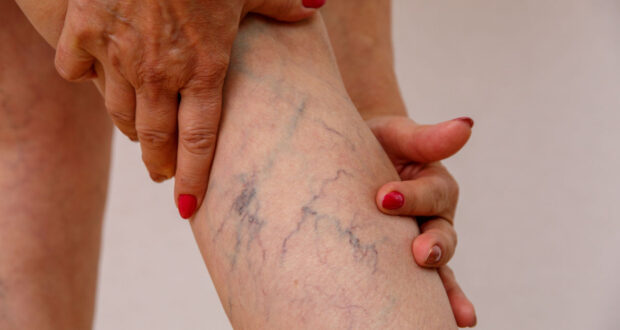By: Guest Author
Published: January 16, 2023
Written by Aaleyah Brown, MD- Guest Contributor
Are you noticing that your veins are looking a bit more like cords lately? You’re not alone. Many women experience an increase in varicose veins during menopause. So what’s the story? Why do these things happen, and is there anything you can do about it? In this post, we’ll take a closer look at varicose veins during menopause and offer up some tips for keeping them at bay. Stay tuned!
Varicose veins are most commonly seen in the legs but can also occur in other parts of the body. These veins are larger than usual and often have a twisty or bulging appearance. They can be painful, and may cause skin irritation or ulcers. While varicose veins can occur at any age, they are most common in older adults. There are several factors that can contribute to the development of varicose veins, including pregnancy, obesity, and a sedentary lifestyle.
While varicose veins are often seen as a cosmetic problem, varicose veins can cause a number of serious health problems, including pain, swelling, and blood clots. There are a number of treatments available for varicose veins, and the best option for each individual will depend on the severity of their condition. Some common treatments include lifestyle changes, such as wearing compression socks or elevating your legs. For more severe cases, your doctor may recommend surgery or laser treatment. With so many options available, there is no reason to live with the pain and discomfort of varicose veins. Talk to your vein specialist today to find out which treatment is right for you.
Decreased Hormone Levels
As women age, they go through a number of changes. One of the most significant changes is menopause, which can cause a decrease in hormone levels. This hormonal imbalance can lead to a number of symptoms, including hot flashes, night sweats, and mood swings. However, new research has found that menopause may also increase the risk of developing varicose veins. Varicose veins are often painful and can make walking or standing for long periods of time difficult. The risk of developing varicose veins increases as hormone levels decline. Therefore, menopausal women may want to consider taking steps to reduce their risk, such as exercising regularly and maintaining a healthy weight.
Reduced Activity
As a woman approaches menopause, her risk of developing varicose veins increases. This is especially true for women who are sedentary. Women who are sedentary are more likely to develop varicose veins. Even if you are otherwise healthy, if you spend most of your time sitting or standing without moving around much, you are more likely to develop these unsightly bulges in your veins.
Taking a break to walk around every hour or so, elevating your legs when you are sitting, and avoiding high heels and tight clothing can all help to reduce your risk. So next time you find yourself being sedentary, remember – it’s not just your legs that need a break, but your veins too!
Family history
Family history is also a risk factor for varicose veins. If your parents or grandparents had varicose veins, you are more likely to develop them as well. There are several things you can do to reduce your risk of developing varicose veins. Exercise regularly, maintain a healthy weight, and avoid sitting or standing for long periods of time. If you have a family history of the condition, you may want to talk to your doctor about taking preventative measures. If you are concerned about developing varicose veins, talk to your doctor about ways to reduce your risk.
________
Aaleyah Brown, MD always had her interest focused in writing. She has worked as a creative and content writer even while in medical school. Currently, she’s a medical assistant at Natural Med Doc. She can provide information about complex diseases and treatments to the public. Combining her clinical knowledge and writing skills, she delivers complicated information in an easy-to-understand manner.
LinkedIn profile: https://www.linkedin.com/in/aaleyahbbrown/
__________________________________________________________________
The views expressed herein this article, written by a guest contributor, do not necessarily represent those of the Red Hot Mamas organization. The content is for informational purposes and should not substitute the advice of your doctor.
 Red Hot Mamas In Charge of Change.
Red Hot Mamas In Charge of Change.




